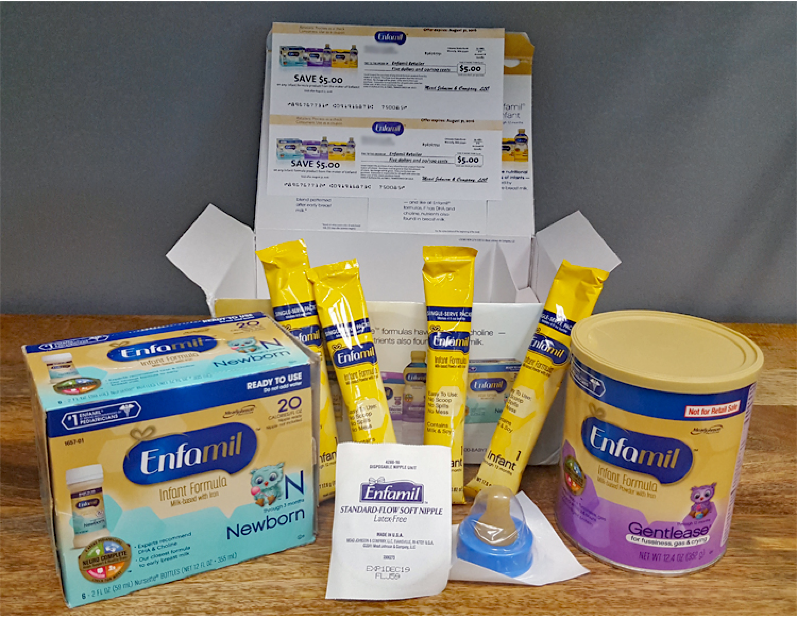
Breastfeeding is a contentious topic in the parenting community for a variety of reasons, especially when it comes to the use of formula. Keep in mind, though, that different moms have different needs. For some, breastfeeding isn’t an option, for either medical or personal reasons.
If you can breastfeed, the vast majority of pediatricians and infant nutrition specialists will agree that you should. Breast milk has hundreds of ingredients to build strong bodies and brains, and scores of special immune boosters (even white blood cells) to enhance immunity and prevent illness, and it has also been found to reduce SIDS.
However, if you can’t or don’t breastfeed for whatever reason, there are many wonderful artificial formulas available. Formula feeding has several ancillary benefits as well. For starters, it is easy to work around your sleep schedule. At bedtime, just put a clean thermos full of clean warm water and a baby bottle with premeasured formula powder by your bed. Then, when your baby gets hungry, mix them together and voilà! You have fresh formula without having to go down to the kitchen and start from scratch. And during those late night feeding sessions, formula also lets your partner give a feeding, allowing you to get a little much needed sleep without the hassle of heating up frozen milk while your baby impatiently waits for their food. It also makes feeding in public much easier for many moms.
Commercial infant formulas are regulated by the Food and Drug Administration (FDA). There are three main types that are available:
- Cow milk protein-based formulas: Most infant formula is made with cow’s milk that’s been altered to resemble breast milk. This gives the formula the right balance of nutrients — and makes the formula easier to digest. Most babies do well on cow’s milk formula. Some babies, however — such as those allergic to the proteins in cow’s milk — need other types of infant formula.
- Soy-based formulas: Soy-based formulas can be useful if you want to exclude animal proteins from your child’s diet. Soy-based infant formulas might also be an option for babies who are intolerant or allergic to cow’s milk formula or to lactose, a carbohydrate naturally found in cow’s milk. However, babies who are allergic to cow’s milk might also be allergic to soy milk.
- Protein hydrolysate formulas: These types of formulas contain protein that’s been broken down (hydrolyzed) — partially or extensively — into smaller sizes than are those in cow’s milk and soy-based formulas. Protein hydrolysate formulas are meant for babies who don’t tolerate cow’s milk or soy-based formulas. Extensively hydrolyzed formulas are an option for babies who have a protein allergy.
In addition, specialized formulas are available for premature infants and babies who have specific medical conditions.
Infant formulas come in three forms. The best choice depends on your budget and desire for convenience:
- Powdered formula: Powdered formula is the least expensive. Each scoop of powdered formula must be mixed with water.
- Concentrated liquid formula: This type of formula also must be mixed with water.
- Ready-to-use formula: Ready-to-use formula is the most convenient type of infant formula. It doesn’t need to be mixed with water. It is by far, however, also the most expensive option.
Be sure to wash your hands before handling formula and carefully follow any mixing and storage instructions.
All infant formulas sold in the United States must meet the nutrient standards set by the FDA. Although manufacturers might vary in their formula recipes, the FDA requires that all formulas contain the minimum recommended amount of nutrients that infants need.
Yes! Your baby needs iron to grow and develop, especially during infancy. If you’re not breast-feeding, using iron-fortified formula is the easiest way to provide this essential nutrient.
Some infant formulas are enhanced with docosahexaenoic acid (DHA) and arachidonic acid (ARA). These are omega-3 fatty acids found in breast milk and certain foods, such as fish and eggs. Some studies suggest that including DHA and ARA in infant formula can help infant eyesight and brain development, but other research has shown no benefit.
In addition, many infant formulas include pre- and probiotics — substances that promote the presence of healthy bacteria in the intestines — in an effort to mimic the immune benefits of breast milk. Early studies are encouraging, but long-term benefits of these substances are unknown.
If you’re unsure about enhanced infant formula, ask your child’s doctor at MacKoul for guidance.
Definitely. Don’t buy or use outdated infant formula. If the expiration date has passed, you can’t be sure of the formula’s quality. Ingredients degrade over time, and using fresh, non-expired formula will ensure that
Infant formula is generally recommended until age 1, followed by 2% milk until age 2 — but talk to your child’s doctor at MacKoul for specific guidance. Reduced-fat or skim milk generally isn’t appropriate before age 2 because it doesn’t have enough calories or fat to promote early brain development.
For those of you who choose to supplement your baby’s diet with formula, we wanted to share a link with you from Enfamil. Here you can find a number of beneficial things, from useful information to a ton free gifts — and even a chance to win free formula for a year!
https://www.enfamil.com/enrollmentIf you have any questions at all about breastfeeding, formula, or your baby’s diet, please don’t hesitate to give your Cape Coral pediatrician a call at MacKoul Pediatrics. A quick call to your baby’s doctor at 239-573-2001 or a conversation when you bring your infant in for a checkup can help answer any questions you might have about what your infant needs to be eating. And remember that no matter whether your breast feed exclusively or make use of formula, we all want the same thing — happy, healthy babies!
MacKoul Pediatrics is an amazing local pediatrics office in Cape Coral, FL where caring, compassionate doctors and nurses work with you to keep your children as healthy as possible. MacKoul cares for children from birth to college age, from Cape Coral, Fort Myers, Naples, and beyond.
November 24, 2017
